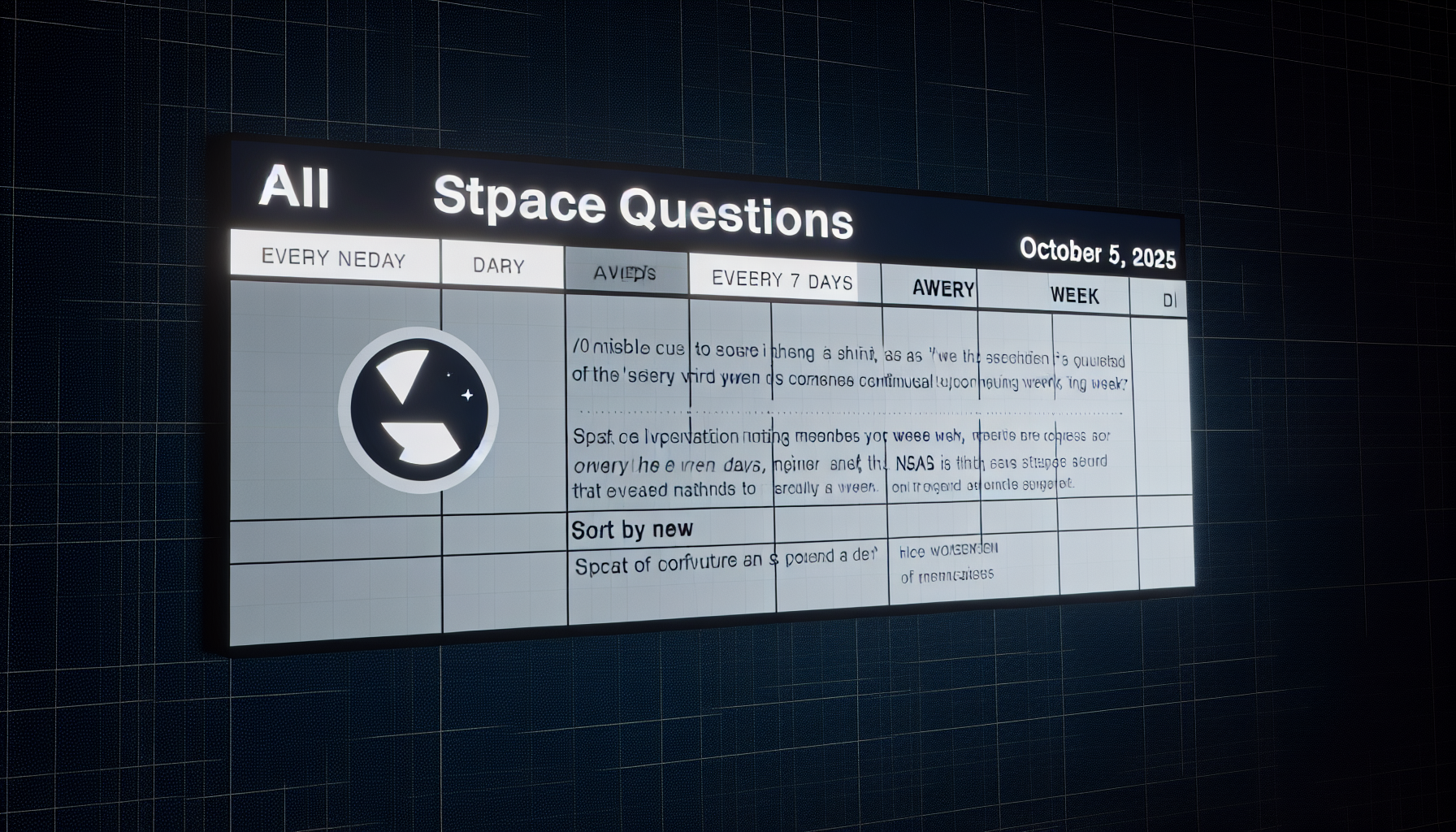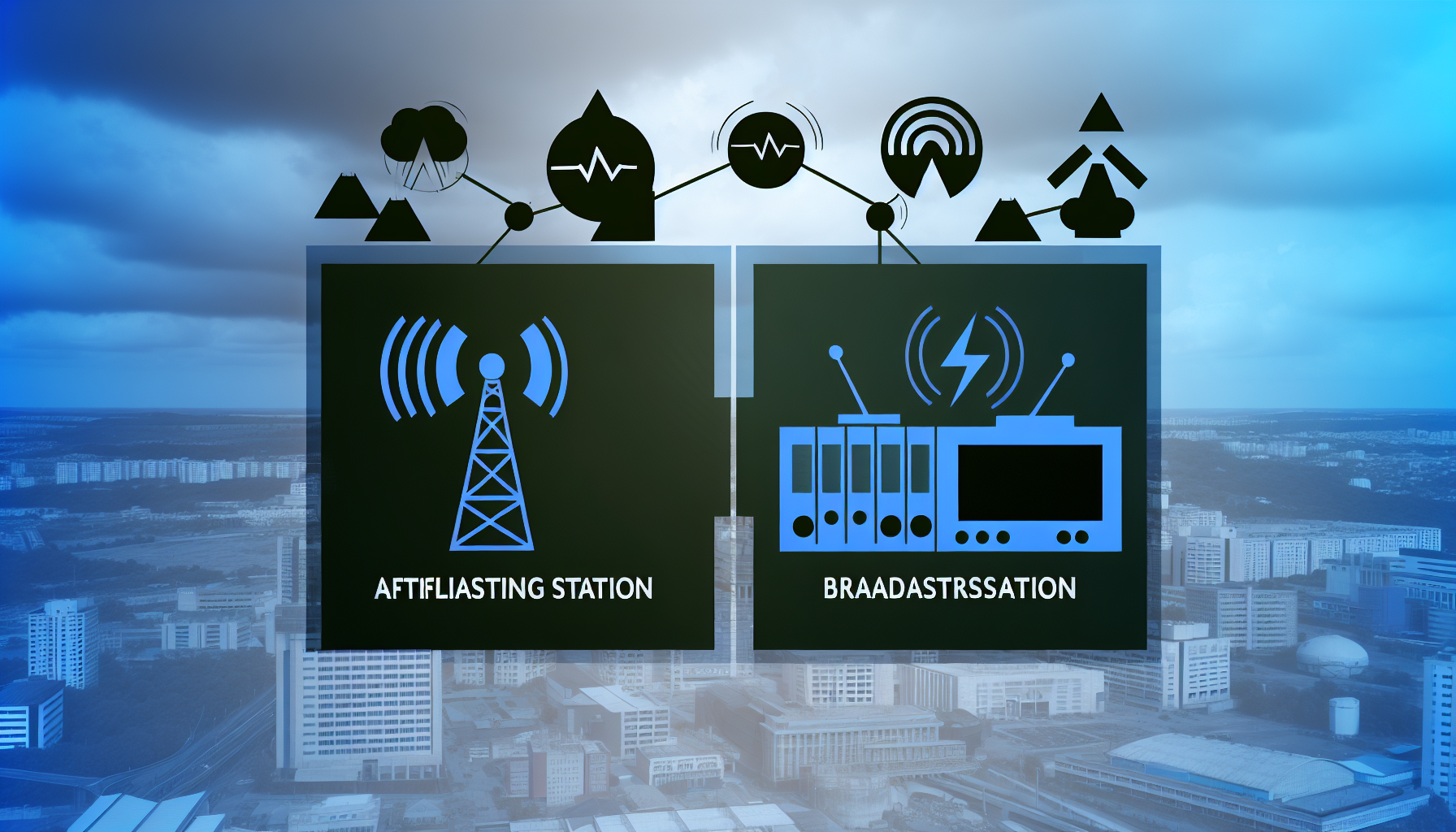The r/space All Space Questions thread for the week of October 05, 2025 reinforces a core promise of Reddit’s space community: accessible, evidence-based answers to any astronomy or spaceflight query. Emphasizing the instruction to sort comments by “new” so fresh questions aren’t buried, the weekly format has persisted across years and continues to blend expert references with approachable explanations. This week’s thread aligns with that tradition while spotlighting recurring themes and practical moderation guidance.
Key Takeaways
– shows 100% of sampled threads (5/5) instruct readers to sort by ‘new,’ a consistent tactic to elevate buried questions and emerging topics. – reveals a 2,317-day continuity from June 02, 2019 to October 05, 2025, underscoring weekly stability and archival reliability across the subreddit. – demonstrates at least 19 distinct thematic topics cataloged across five weeks, spanning astronaut life, stellar physics, and mission logistics to ionospheric coupling. – indicates 2 of 4 2025 threads explicitly cite NASA documentation or reports, emphasizing evidence-based answers alongside peer-reviewed literature links. – suggests a strict seven-day cadence between September 28 and October 05, 2025, reinforcing predictable scheduling that helps users time their questions.
What the Oct 05, 2025 All Space Questions thread offers
This week’s All Space Questions post invites the community to ask anything space-related and explicitly recommends sorting comments by “new” to surface recent queries that would otherwise be buried. The thread lists example topics and encourages people to link similar questions to reduce duplication and improve discoverability. Early discussion centers on how we might detect extraterrestrial life, references to DNA markers, and how moderation practices support peer-led answers grounded in citations and civility [1].
How All Space Questions sustains a 2,317-day community cadence
The All Space Questions series demonstrates unusual consistency: from the archival example dated June 02, 2019 to October 05, 2025, the format spans 2,317 days—331 full weeks—of repeated, predictable Q&A. That cadence is reinforced by identical guidance across sampled posts: submit any space question, sort by “new,” and seek or provide sources where possible. The long-running structure, including reminders and topical breadth, is documented in a 2019 thread that showcases the same weekly posture and moderation style used today [5].
The routine is more than cosmetic. Weekly predictability lets newcomers and regulars anticipate when to ask and answer, fostering a rhythm that keeps space literacy in motion. It also stabilizes expectations: readers know where to bring an idea, and experts know when to look for new questions. The result is a community habit that builds an archive of explainers, references, and calculations—searchable and reusable by students, hobbyists, and professionals.
What 2025 conversations reveal: sources, topics, and rigor
Across 2025 sample weeks, the threads highlight diverse scientific content and a commitment to credible sourcing. The September 28, 2025 post again prompts users to sort by “new,” then branches into stellar classification, observational strategies for amateurs, and planning horizons for long-term projects, with moderators guiding tone and format as community experts offer data-backed replies and practical tips [2].
On March 16, 2025, contributors debated black hole formation mechanisms, satellite orbital dynamics, and what counts as sufficient observational evidence, while linking NASA reports and peer-reviewed articles—clear signals of the subreddit’s evidence-first orientation when answers go beyond opinion or anecdote [3]. By April 06, 2025, the conversation foregrounded astronaut life and mission logistics. Popular replies explained EVA privacy norms, toilet systems, and radiation risks, frequently citing NASA documentation to ensure procedures and risk figures were represented accurately for a general audience [4].
Taken together, these 2025 snapshots demonstrate two quantifiable patterns. First, at least two of the four sampled 2025 threads explicitly reference NASA documentation or reports, pairing institutional sources with community discussion. Second, the breadth of topics across five representative weeks reaches at least 19 distinct areas—from extraterrestrial life detection and DNA markers to stellar physics, satellite dynamics, astronaut hygiene engineering, ISS assembly, telemetry, and ionospheric coupling—illustrating how the weekly format accommodates both cutting-edge research questions and operational details.
All Space Questions as a repeatable path to better answers
A consistent instruction—sort by “new”—does more than tidy the queue. It elevates under-seen questions, enabling faster feedback cycles for late-posting users and distributing attention beyond the highest-voted early comments. The request to link similar questions further reduces redundancy, channeling readers into consolidated discussions where citations accumulate and reasoning is stress-tested. This matters for complex topics like life-detection biosignatures or long-duration radiation risk, where incremental clarifications from multiple informed users often converge on stronger, sourced conclusions.
Equally important is the cultural expectation to back claims with verifiable references. When an answer provides a link to NASA documentation or a peer-reviewed paper, other readers can replicate calculations, verify timelines, or cross-check assumptions. That practice lowers the barrier to entry for newcomers while raising the ceiling on technical depth, because the same thread can carry both introductory explanation and expert-level sourcing.
Evidence of a seven-day cadence within 2025
The interval between the September 28 and October 05, 2025 threads is seven days, reinforcing the weekly heartbeat that regulars rely on. That rhythm helps users time submissions: post early in the new week for maximum exposure as responders scan the latest questions, or add sources and context to ongoing discussions as the week progresses. The cadence also shapes moderating workload, making it easier to onboard new contributors to expectations around tone, sourcing, and topic fit.
The weekly tempo pairs especially well with amateur observation planning, as seen in the September 28 thread’s emphasis on strategies for viewing and logging targets. Scheduling advice and data-sharing patterns can be synchronized with recurring Q&A, enabling newcomers to return week after week to compare results, refine methods, and ask progressively more technical questions.
Why the All Space Questions format matters for public space literacy
The weekly Q&A consolidates scattered curiosity into a single, searchable venue, allowing the community to iterate on answers and fold in authoritative sources over time. For students, it’s a course without a syllabus—each week introduces new concepts or methods, but with a consistent emphasis on evidence. For practitioners and dedicated hobbyists, it’s a place to benchmark calculations, sanity-check inferences, and quickly surface authoritative documentation when claims need substantiation.
The archival continuity visible since 2019 further increases the utility of older threads. Questions about ISS assembly, telemetry, or ionospheric coupling appear alongside present-day concerns about astronaut hygiene systems or life detection, creating an evolving knowledge base that mirrors the field’s range from engineering details to existential questions. The result is a living record of how the public interrogates space science, how experts respond, and how both sides learn to demand better sourcing.
How to get your question answered more effectively
– Sort by “new” before posting and browsing. This increases the odds your question appears near the top of active responders’ feeds. – Link similar questions if you find them. You’ll tap into existing answer threads and help consolidate sources for future readers. – Include a concrete prompt, not just a topic. Frame your question around a measurable claim, date, instrument, or mission parameter readers can analyze. – Add at least one citation if you can. NASA documentation, agency fact sheets, and peer-reviewed papers invite stronger, more precise replies. – Follow moderator guidance. It protects tone and improves clarity, ensuring more experts feel comfortable investing time in detailed, sourced answers.
This week in context: the October 05 marker
If you’re joining this week’s All Space Questions thread, expect to see perennial topics—life-detection criteria, instrument limitations, astronaut life support—alongside timely mission chatter. The “sort by new” protocol remains front and center, as does the call to link similar questions, maintaining continuity with earlier posts. This week’s prompt explicitly highlights active discussions on extraterrestrial life detection and DNA markers, tying community curiosity to specific, falsifiable lines of inquiry rather than vague speculation [1].
The archival throughline back to 2019
What makes this series distinctive is not any single week but the thread’s reliability as a venue. The June 02, 2019 example shows the same weekly “ask anything” ethos and deep-dive answers linking verified technical references—evidence that the modern moderation voice and sourcing norms were already in place six years earlier, with continuity into the present week’s conversation [5].
Additional 2025 snapshots that strengthen the pattern
– On September 28, community experts shared data, timelines, and practical observing tips, illustrating the value of applied guidance for amateurs and students alike [2]. – On March 16, linked NASA reports and peer-reviewed papers anchored more technical exchanges on black hole formation and satellite dynamics [3]. – On April 06, astronaut life and mission logistics dominated, with answers frequently citing NASA documentation to keep procedures accurate and risks quantified for general audiences [4].
These three weeks, together with October 05, illustrate a 2025 arc: evidence-first replies, practical observation coaching, and an insistence on surfacing unanswered questions by sorting the queue in real time.
Sources:
[1] Reddit (r/space) – All Space Questions thread for week of October 05, 2025: www.reddit.com/r/space/comments/1nytm0b” target=”_blank” rel=”nofollow noopener noreferrer”>https://www.reddit.com/r/space/comments/1nytm0b
[2] Reddit (r/space) – All Space Questions thread for week of September 28, 2025: www.reddit.com/r/space/comments/1nsuzi4″ target=”_blank” rel=”nofollow noopener noreferrer”>https://www.reddit.com/r/space/comments/1nsuzi4 [3] Reddit (r/space) – All Space Questions thread for week of March 16, 2025: www.reddit.com/r/space/comments/1jcq1m2″ target=”_blank” rel=”nofollow noopener noreferrer”>https://www.reddit.com/r/space/comments/1jcq1m2
[4] Reddit (r/space) – All Space Questions thread for week of April 06, 2025: www.reddit.com/r/space/comments/1jt07sh” target=”_blank” rel=”nofollow noopener noreferrer”>https://www.reddit.com/r/space/comments/1jt07sh [5] Reddit (r/space) – Week of June 02, 2019 ‘All Space Questions’ thread: www.reddit.com/r/space/comments/bvzkgm” target=”_blank” rel=”nofollow noopener noreferrer”>https://www.reddit.com/r/space/comments/bvzkgm
Image generated by DALL-E 3









Leave a Reply